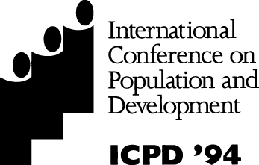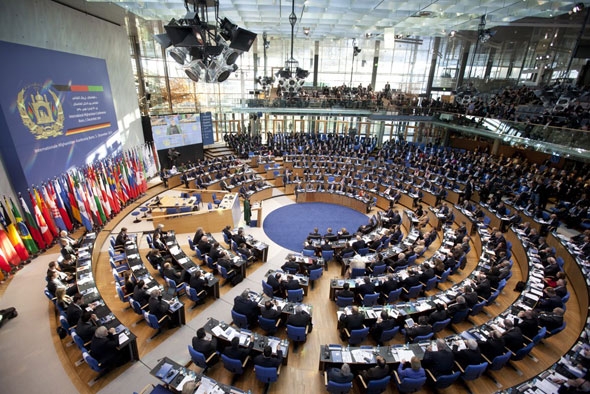ICPD: Developments and Disappointments
Today, we move on to another topic that surfaced during our Tweetathon: a liberal law on abortion does not guarantee access to safe termination services. This discrepancy is often the result of irresponsible governments, and a lack of knowledge on how to hold them accountable. For the remainder of this week we will discuss the ICPD, CEDAW and the MDGs, which should give you some ammunition for your advocacy!
 At the 1994 International Conference on Population and Development held in Cairo and attended by 20,000 delegates from national governments, UN agencies and NGOs, remarkable progress was made for reproductive rights. To quote the UNFPA, “…the world agreed that population is not just about counting people, but about making sure that every person counts.” It was understood and agreed upon that gender equality, and women’s empowerment were crucial to any effort aimed at stabilizing growing populations, and battling poverty.
At the 1994 International Conference on Population and Development held in Cairo and attended by 20,000 delegates from national governments, UN agencies and NGOs, remarkable progress was made for reproductive rights. To quote the UNFPA, “…the world agreed that population is not just about counting people, but about making sure that every person counts.” It was understood and agreed upon that gender equality, and women’s empowerment were crucial to any effort aimed at stabilizing growing populations, and battling poverty.
One of the key points discussed in the ICPD Program of Action concerns women’s reproductive health:
Provide universal access to family planning and sexual and reproductive health services and reproductive rights.
The ICPD was key in shifting the world’s focus from fertility control to more comprehensive programs that allowed men and women to participate in planning their own families, lives and future.
But when it came to safe abortions – as always – diplomacy trumped women’s rights, and the ICPD holds that abortion be safe where it is legal. It does not explicitly include abortion as a reproductive right, and demand for the legalization of abortion. Marge Berer, the editor of Reproductive Health Matters writes about this Cairo compromise in an excellent article that can be read here.
We have seen other developments since the ICPD. CEDAW, the Committee for the Elimination of Discrimination Against Women, has stood up for safe abortion rights on many counts.
The Center for Reproductive Rights scored for women when it announced that safe and legal abortion is a woman’s right. In November 2011, Anand Grover, UN Special Rapporteur on the right of everyone to the enjoyment of the highest attainable standard of physical and mental health, scored again, when he said, “Criminalization of abortion is the ultimate expression of that interference; it discriminates against, disempowers and stigmatizes women.” He also goes on to question the persecution of women for seeking these services.
However there have been plenty of disappointments too. The recent review of the Millenium Development Goals does not explicitly measure the burden of unsafe abortion on maternal mortality. In recent times, the rise of conservative politics and religious fundamentalism have forced several countries to go back in time, and ban or restrict safe abortion services. In addition, by focusing on the semantics of abortion, large, well funded, religious organizations have been drawing attention away from this growing public health crisis.
Studies however indicate that this global crisis is costing women very dearly. Every year 42 million abortions take place around the globe, and at last 20 million are unsafe. About 5 million women suffer long term complications, while 47,000 according to the WHO, die of these unsafe procedures. Several women leave behind several children entrenched in poverty.
 The world responded to this by coming together to promote contraception, and birth control. But the need for safe abortions remains unmet, and women with no access to contraception or those who have contraception failures are still forced to risk unsafe abortions in many parts of the world.
The world responded to this by coming together to promote contraception, and birth control. But the need for safe abortions remains unmet, and women with no access to contraception or those who have contraception failures are still forced to risk unsafe abortions in many parts of the world.
A few days after the recent family planning summit in London, Marge Berer wrote an article on Reality Check about the need to stop promoting contraception as an alternative to abortion. She stressed on the need to promote family planning as a combination of birth control and abortion, to maximize the benefits for women.
But abortion and family planning are divorced in the guidebook of many major donors, and while the plea to include abortion is resounding around the globe, it is hard to imagine they will change their attitudes so quickly.
We sent some of these dismal comments with questions to Prof. Gita Sen, public policy expert, Founder of DAWN (Development Alternatives With Women for A New Era) and professor at the Indian Institute for Management in Bangalore. We will publish her responses tomorrow. Though the situation is not all cheery, Prof. Sen does not think all is lost.
A UN-mandated review of the ICPD is coming up in 2014. Called “ICPD beyond 2014” or ICPD+20, this meeting will hopefully move beyond the ICPD and include safe abortion as a woman’s right.






